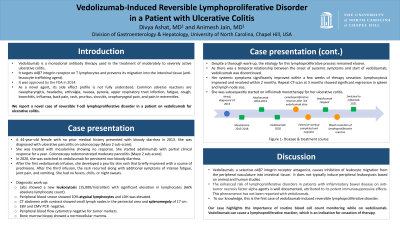Back


Poster Session D - Tuesday Morning
Category: IBD
D0426 - Vedolizumab-Induced Reversible Lymphoproliferative Disorder in a Patient With Ulcerative Colitis
Tuesday, October 25, 2022
10:00 AM – 12:00 PM ET
Location: Crown Ballroom

Has Audio

Divya Ashat, MD
University of North Carolina
Iowa City, IA
Presenting Author(s)
Divya Ashat, MD1, Animesh Jain, MD2
1University of North Carolina, Iowa City, IA; 2University of North Carolina, Chapel Hill, NC
Introduction: Vedolizumab is a monoclonal antibody used in ulcerative colitis and Crohn's disease, targeting the ɑ4β7 integrin receptor on T lymphocytes. Lymphoproliferative reactions have not been reported with Vedolizumab. We report a case of reversible T-cell lymphoproliferative disorder in a patient on vedolizumab.
Case Description/Methods: A 44-year-old female presented in 2013 with bloody diarrhea and was diagnosed with ulcerative colitis (unclear extent). She was treated with mesalamine and then later with adalimumab. She had a secondary loss of response to adalimumab and was switched to vedolizumab in 2020. After the first vedolizumab infusion, she developed a pruritic skin rash that briefly improved with a course of prednisone. After completing the third infusion, the rash recurred along with symptoms of intense fatigue, joint pain, nausea, and vomiting. She had no fevers, chills, or night sweats. Labs showed a new leukocytosis (15,000/microliter) with significant elevation in lymphocytes (66% absolute lymphocyte count). Peripheral blood smear showed 10% atypical lymphocytes and LDH was elevated. A CT abdomen with contrast showed small lymph nodes in the perirectal area and splenomegaly of 17 cm. Findings were concerning a lymphoproliferative disorder and the patient was referred to hematology. Testing for EBV and CMV were negative. Peripheral blood flow cytometry was negative for tumor markers (negative CD7, CD16, and CD57) and bone marrow biopsy showed a normocellular bone marrow. Despite a thorough work-up, no other etiology for this lymphoproliferative disorder was found. Since there was a temporal relationship between the onset of systemic symptoms and the start of vedolizumab, vedolizumab was discontinued. Her systemic symptoms significantly improved within a few weeks of therapy cessation. Her lymphocytosis improved and resolved within 2 months. Repeat CT-scan at 3 months showed significant regression in spleen and lymph node size. The patient was subsequently started on infliximab monotherapy for her ulcerative colitis.
Discussion: The enhanced risk of lymphoproliferative disorders in patients with inflammatory bowel disease on anti-TNFα agents is well documented. This phenomenon has not been reported with novel biologic therapies, such as vedolizumab. To our knowledge, this is the first case of vedolizumab-induced reversible lymphoproliferative disorder and highlights the importance of routine blood cell count monitoring while on this therapy.
Disclosures:
Divya Ashat, MD1, Animesh Jain, MD2. D0426 - Vedolizumab-Induced Reversible Lymphoproliferative Disorder in a Patient With Ulcerative Colitis, ACG 2022 Annual Scientific Meeting Abstracts. Charlotte, NC: American College of Gastroenterology.
1University of North Carolina, Iowa City, IA; 2University of North Carolina, Chapel Hill, NC
Introduction: Vedolizumab is a monoclonal antibody used in ulcerative colitis and Crohn's disease, targeting the ɑ4β7 integrin receptor on T lymphocytes. Lymphoproliferative reactions have not been reported with Vedolizumab. We report a case of reversible T-cell lymphoproliferative disorder in a patient on vedolizumab.
Case Description/Methods: A 44-year-old female presented in 2013 with bloody diarrhea and was diagnosed with ulcerative colitis (unclear extent). She was treated with mesalamine and then later with adalimumab. She had a secondary loss of response to adalimumab and was switched to vedolizumab in 2020. After the first vedolizumab infusion, she developed a pruritic skin rash that briefly improved with a course of prednisone. After completing the third infusion, the rash recurred along with symptoms of intense fatigue, joint pain, nausea, and vomiting. She had no fevers, chills, or night sweats. Labs showed a new leukocytosis (15,000/microliter) with significant elevation in lymphocytes (66% absolute lymphocyte count). Peripheral blood smear showed 10% atypical lymphocytes and LDH was elevated. A CT abdomen with contrast showed small lymph nodes in the perirectal area and splenomegaly of 17 cm. Findings were concerning a lymphoproliferative disorder and the patient was referred to hematology. Testing for EBV and CMV were negative. Peripheral blood flow cytometry was negative for tumor markers (negative CD7, CD16, and CD57) and bone marrow biopsy showed a normocellular bone marrow. Despite a thorough work-up, no other etiology for this lymphoproliferative disorder was found. Since there was a temporal relationship between the onset of systemic symptoms and the start of vedolizumab, vedolizumab was discontinued. Her systemic symptoms significantly improved within a few weeks of therapy cessation. Her lymphocytosis improved and resolved within 2 months. Repeat CT-scan at 3 months showed significant regression in spleen and lymph node size. The patient was subsequently started on infliximab monotherapy for her ulcerative colitis.
Discussion: The enhanced risk of lymphoproliferative disorders in patients with inflammatory bowel disease on anti-TNFα agents is well documented. This phenomenon has not been reported with novel biologic therapies, such as vedolizumab. To our knowledge, this is the first case of vedolizumab-induced reversible lymphoproliferative disorder and highlights the importance of routine blood cell count monitoring while on this therapy.
Disclosures:
Divya Ashat indicated no relevant financial relationships.
Animesh Jain indicated no relevant financial relationships.
Divya Ashat, MD1, Animesh Jain, MD2. D0426 - Vedolizumab-Induced Reversible Lymphoproliferative Disorder in a Patient With Ulcerative Colitis, ACG 2022 Annual Scientific Meeting Abstracts. Charlotte, NC: American College of Gastroenterology.
